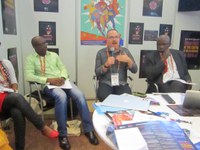CLC participates in International Conference on AIDS and STIs in Africa (ICASA)
During the opening ceremony on 7 December, Zambia's first lady, Her Excellency, Christine Kaseba- Satta who was the Special Guest at the occasion charged delegates to address issues around declining access to sexual and reproductive health (SRH) services, forge closer links between SRH and HIV services as well as address gender based- violence (GBV) issues.
In his own remarks, UNAIDS Executive Director, Mr. Michel Sidibe stressed the need to make prevention the central focus of the AIDS response. While noting that the late Nelson Mandela championed Science over superstition, he stressed the need for inclusiveness in country’s responses to the epidemic. He also challenged participants to make ending AIDS a reality and a true legacy to Mandela. In his own address, South Africa’s Deputy President Kgalemathe Motlanthe noted that community-centred approaches are critical to accelerating response to the AIDS pandemic.
He thanked delegates for the honour and respect accorded to the late Mandela, noting that the passing away of Mandela was not only a loss to South Africa but to the entire world.
The first panel discussion on Human Rights in Light of Contemporary Science of HIV Treatment and Prevention featured presentations from four panellists- Matt Kavanagh (Health Gap Consultant), Lynette Mabote (ARASA), Badara Samb (UNAIDS) and Ebenezer Durojaye Community Law Centre. The panellists examine the human rights implications of new development in the area of HIV treatment, including WHO recommendation on the commencement of antiretroviral therapy (ARV). The discussions centre around what this development would mean for governments across the world as regards improving access to medicines.
In his presentation, Ebenezer Durojaye examines the role of the African Commission on Human and Peoples Rights in ensuring that African governments meet their obligations to respect protect and fulfil the right to health of their citizens. He argues that new development in science with regard to HIV treatment raises various human rights challenges and requires the African Commission to be more proactive and vigilant in monitoring governments’ performance and ensuring that human rights of Africans are not undermined. He notes further that the promotional and protective mandate of the Commission put it in a very important position to evaluate steps and measures adopted by African governments in response to new development on HIV treatment.
For instance, he argues that the recent WHO recommendation on the commencement of ARV requires African government to commit more of their resources to addressing the HIV pandemic and adopting more progressive legislation that will facilitate access to life-saving medication in the region. Since African governments have reporting obligations under the African Charter, the Commission can raise these issues when examining states reports submitted to it. Moreover, the Commission can issue resolutions and General Comments to clarify African governments’ obligations with regard to development in science of HIV treatment.
In his second presentation at a panel discussion on Forced Sterilisation as a Human Rights Challenge in the Context of HIV, Ebenezer Durojaye discusses the relevance of the recently adopted resolution of the African Commission for advancing the sexual and reproductive rights of women in the region. He notes that while the resolution is not binding, it provides a useful guidance for African governments to be more alive to their human rights obligations regarding forced sterilisation. According to him, the Commission adopted a holistic approach to forced sterilisation by condemning it as a human rights violation and requiring African government to ensure universal access to sexual and reproductive health care services for everyone, particularly women living with HIV.
Apart from calling on African governments to restrain from forced sterilisation, it also enjoins them to establish national guidelines on sterilisation in general. Such guidelines must correspond with international standards and be respectful of human rights of the people. He concludes by noting that civil society groups across Africa can play an important role in popularising the resolution and using it as tool of advocacy when they engage with policy makers as=t the national level.
The International Conference on AIDS and STIs in Africa is the continent’s largest gathering of HIV/AIDS scientists, policy makers, researcher, activists, People Living with HIV, government leaders and civil society representatives.

